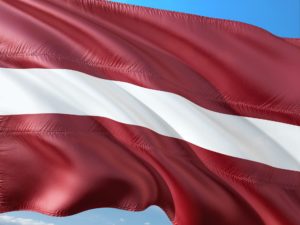You have no items in your cart. Want to get some nice things?
Go shopping
Picture Credits: RonnyK
In memory of Juris Arturs Zarins, 1944–2019.
There is a small nation in the north-east, where cold and dark rule for most of the year. A country that’s spent most of its history in unions with other empires, and freedom has been recent. It’s a country still divided by ethnicities and languages, but united in patriotism. Each year fewer people stay who were born there, but each year some return who never lived there. In 2018 that country celebrated its 100th anniversary as an independent nation, despite spending nearly half that time inside the walls of largest Union in the world. The whole year was one long Latvian birthday party, because freedom is worth celebrating, and democracy is worth protecting.
But freedom comes at high costs, and requires plenty of responsibility. In the first few years after declaring independence, and in the twenty-seven years since it regained it, Latvia learned this the hard way. And it is a lesson, and a price, my adopted home country of the United Kingdom, is learning, and paying, through Brexit.
*
For a small country of barely two million inhabitants, Latvia has an enormous diaspora, of which I am part. My paternal grandparents left Latvia in 1944, when they were thirty years old and their homeland was twenty-six. This was at the end of three years of German occupation, and their army, civil service and civilians were retreating at the approach of the Red Army. Alongside them, many Latvians fled the returning Soviets, who had ruled the country for a year known as the Year of Terror before the German invasion. The Latvian Army and national guard had been deployed as “voluntary” regiments under German command to fight the USSR on the eastern front. My grandfather had been one of them; he lost his right hand in a grenade explosion at Stalingrad. He, and thousands of others, did not want to face the wrath of the conquering Soviets, and so decided to leave.
Two routes were available for their escape: the official one, to Germany proper, on ships provided by the German navy to ensure a willing workforce after the war they knew they were losing; and the unofficial one, in fishing and leisure boats arranged by non-violent resistance groups, to Sweden. No one knew before they went which vessels would be safer; the German ships were larger and stronger, but also an easier target in the busy Baltic Sea. No one could know what was waiting on the other side. Sweden was neutral, and Germany was losing the war, but Latvia had belonged to Germany. As history would have it, more Latvians died on route to Germany than to Sweden, but more also made it there alive. In Sweden the diplomatic resistance continued, but the Swedish government also gave in to USSR demands for the mass extradition of Baltic soldiers, on the motivation that having fought for Germany, they were war criminals belonging to the Soviets. The overseas efforts to free Latvia were silenced until the 1980s. No one knew this then, of course, so as my grandparents stood on the western beaches of Latvia and decided where to go, nothing was certain, and everything was dangerous.
They went to Sweden. My father was born there, and thirty-three years after that I was born there. Latvia was still part of the Soviet Union, but the white and burgundy flag hung in our house, and a large map of Latvia hung like the portrait of Scarlett O’Hara in the hallway. National identity can be strong for a people in exile, even for the generations who weren’t born there. Latvia was our promised land, and when the Singing Revolution came, we sang along with it. For freedom.
My grandfather died shortly after my father was born. My grandmother died shortly after Latvia became independent. A few years after this, as a result of a referendum where my mother let me tick the box for “yes”, Sweden entered the European Union. Latvia’s rapid financial growth in the 1990s and early 2000s, following reforms and an embrace of market economy, led them to EU and NATO memberships in 2004. At last it was a true independent nation, free to join whichever union they liked, on equal terms and in the national interest. Because freedom is precious, and democracy is not to be taken for granted.
The financial crash of 2008, however, hit the small nation hard. The EU membership had made investments and subsidies possible, but it also made it possible for people to seek their fortunes elsewhere. Latvia now has the highest annual population loss per capita in the world, with low wages and struggling markets keeping poverty levels increasingly high. Freedom comes at a cost, and Latvia is a nation struggling between the benefits and consequences of union memberships. Since Russia’s annexation of Crimea in 2014, NATO has increased its presence in the Baltic states, and Latvia has called for action on Russian cyber interference. Freedom is threatened. Which means there is even more reason to celebrate it.
2018 was a year of Latvian celebrations, and I took part in as many as I could. In July there was the Song and Dance Celebration, a tradition that not even the Communist rule of the 20th century could extinguish. On 14 November, I went to a concert[£] hosted by the Latvian Embassy at Wigmore Hall in London, that celebrated Latvian culture, independence and long standing diplomatic relationship with the UK. EU flags stood like comrades alongside the Latvian ones on the stage, in case there was any doubt. Only a few days later, I went to Riga to celebrate the actual Independence Day, on the 18th of November. A flower-laying ceremony and speeches by the President, light shows and a torch bearing procession, with a finale of spectacular fireworks over the river Daugava were on the agenda. But the most political part of the day was probably the military parade along the 11 November Embankment in the early afternoon. Participants from all aspects of the Latvian army and its NATO allies, were on a long display through the city, with military aircraft, vehicles and weaponry to complete the image of a country prepared and capable. The parade was a message, just as much as the burgundy and white flags were, just as much as the singing of the national anthem was. 18 November was the highlight day of a monumental year, with promoted patriotism and pride the likes of which I have never seen. To not be swept up in it and feel pride of my link to Latvia was impossible.
Other eastern European nations, like Estonia, Lithuania, Poland and Finland, also celebrated their centenaries in 2017 and 2018. They are young nations that still remember being on the wrong side of the iron curtain. For them, being free and part of international organisations such as the EU and NATO, under their nation’s own name and flag, is not only about diplomacy, but of survival. From liberal Balts’ perspective, the UK’s departure from the European Union is not only incomprehensible, but possibly disastrous.
However, isn’t it hypocritical to celebrate one’s own independence, and simultaneously condemn another nation’s fight for it? Regaining control of borders and laws and financial expenditure in the name of a beloved home country was what drove both Latvian independence and Brexit. As a young European enjoying all of the four freedoms in a country different from that of my birth, I am a staunch Remainer who didn’t get to vote. But singing for one independence whilst screaming at another has made me reassess them both. My relationship with Latvia has been accompanied by the developments of Brexit. I first visited Latvia in June 2016, a couple of weeks before the referendum. In July 2018, I attended the Song and Dance festival and travelled around Latvia on the same day as the Chequers deal was published. On the night that I attended the Latvian concert in London, the government debated and signed the final deal only a few kilometres away, before further cabinet resignations. And exactly one week after the Independence Day festivities in Riga, EU leaders endorsed the Brexit withdrawal agreement. And now, the consequences of Brexit remain uncertain while the future of Latvian independence remain threatened.
It’s a fine line between patriotism and nationalism, and its placement seems to differ depending one’s perspective of it. The rise of populist movements across Europe, from the Sweden Democrats and Alternative für Deutchland to the Five Star Movement and Front National, has given love for one’s country a bad reputation amongst liberals and lefties. The populist party in Latvia is also Euro-sceptic, anti-establishment and prominent; but instead of nationalistic it is pro-Russian.
Some of the reasons why people in the UK are keen to leave the EU, such as free movement and financial contributions, are some of the strongest benefits of the membership for countries like Latvia. Cooperation and unity are in the national interest, particularly when the threat of an absorption into a different kind of union again looms over its borders.
To be patriotic, to worship freedom for your country, might be linked to a nostalgia for something that might never even have existed; a myth passed down between generations. That’s certainly the case for me and Latvia; I don’t know anything about what it was like to live in Latvia under occupation, or what its independence truly means. Neither did my grandmother. The political and economic difficulties the country now faces is the reality of a dream housed by us in the diaspora. It is easy for us to be patriotic for Mother Latvia, living with university degrees and job prospects and the world at our feet in London, Berlin and Stockholm.
I imagine it’s the same for some Brexiteers. The inherited mythologies surrounding the Empire, tough and free in the weathered landscapes of the island nation that rules the waves, become stronger in times of hardship, when one might feel ruled by the waves of Brussels. To be patriotic is to want freedom, no matter what that dream is built upon, and regardless of what the reality of Brexit means. To be patriotic, might also be to be nostalgic. I find myself empathising with those Leave-voters there.
So in the same year that Latvia celebrated its independence, the price of the UK’s independence has become evident. Perhaps the only way to be truly free is to challenge our own double standards, in order to respect other people’s wishes and opinions. If individuals are allowed to be free, they are able to create unity. Only through unity and respect, can we be truly free.
Subscribe to Litro Lab via itunes RSS | More

About Jessica Zarins
Jessica Zarins is a Swedish-Latvian writer with a BA in Creative Writing and an MA in Modern and Contemporary Literature. She writes about identity, nature and belonging on her blog (www.jessbranches.worpress.com) and nationality and current affairs on Twitter (@JessBranches). She lives in Cambridge in the UK.
- Web |
- More Posts(1)





This is fresh perspective on what has now become well-trodden ground; I’m fascinated.